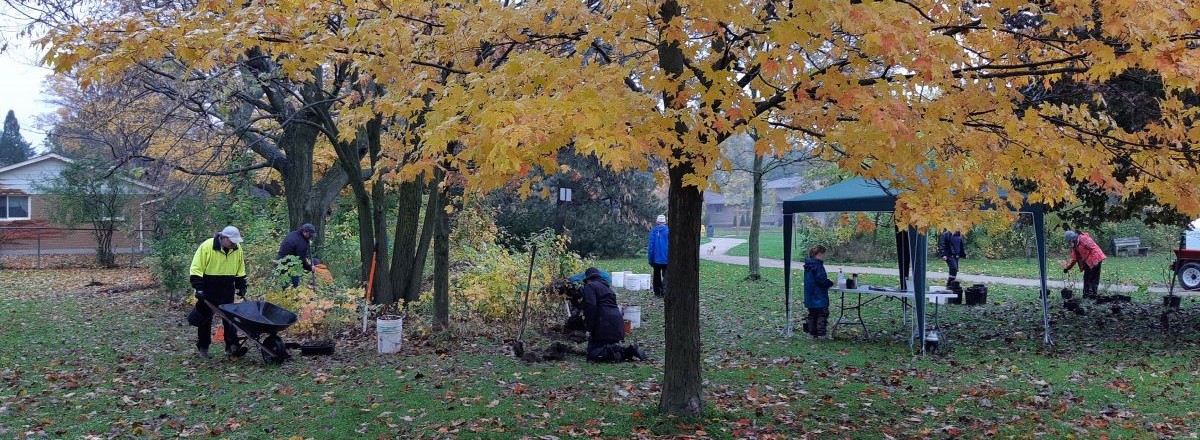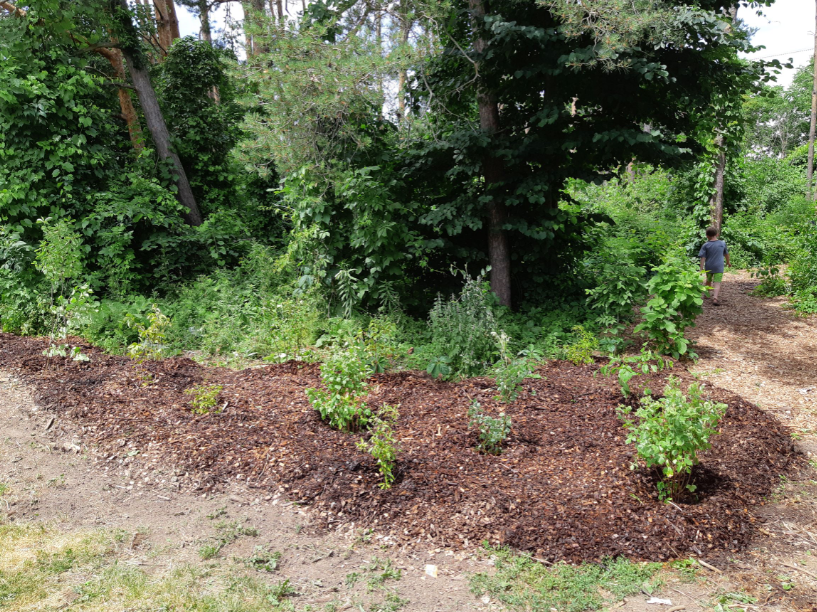On this page

Caring for nature in your neighbourhood
Parks Stewards projects are community-led projects where groups of neighbours come together to “adopt” and help care for natural or “wild” areas in parks city-wide. Participating in the program is a great way to meet your neighbours and build community, while learning about and gaining experience related to caring for natural wild spaces. By participating in this program, you can learn about native trees, shrubs, plants, invasive species and more.

What does it mean to become a Parks Steward?
Participants in this program help to care for or “adopt” natural spaces in their neighbourhoods. This is a potential opportunity in any neighbourhood park or city-owned natural area.
There are two main ways to get involved:
- Join an existing group (see Guelph’s Park Stewards Network)
- Start your own Park Stewards group
To get started with a new Park Stewards project, we recommend as a first step you connect with city staff at [email protected] for more resources, support and information.
We’ve also identified a few of the main ways you can act as Park Stewards below.
- Plant native trees, shrubs, and/or pollinator friendly plants*
- Remove and help control problematic plants (e.g., non-native, invasive or weeds)
- Care for existing native plant life (e.g., monitoring, reporting, mulching, watering)
- Create wildlife habitat projects (e.g., bird boxes, bee hotels)
- Clean-up litter
- Educate your community (e.g., host a stewardship-related community work-day or educational event, install signage)
* Note that parks stewardship projects are intended to be focused on natural areas or “wild” areas. There is a separate process for creating a new community pollinator garden, an orchard/food forest, or community garden project in a park. For more information on these, visit guelph.ca/communitygardens.
What if I’m not ready to commit to adopting a space on an ongoing basis, but I’m interested in other stewardship activities in parks such as planting trees or picking up litter?
Please contact us anytime at [email protected] if you are interested in organizing a one-time tree planting event with a large group of people or contact us to join our mailing list to find out about upcoming community tree plantings.
If you are interested in doing a litter/garbage pick-up anywhere in Guelph parks, this can be done at any time of year without formally creating a Parks Stewards group project. See guelph.ca/cleanandgreen for details.
If you are considering starting a parks stewards project, litter collection can be one activity as part of a suite of other stewardship actions your group undertakes on a regular basis.
What have others done as part of this program?
See the great work that existing Guelph’s Park Stewards groups have done so far and get inspired!
Steps for success in starting your own new Parks Stewards group
1. Talk to your neighbours, identify a core group of participants/committee
It’s recommended to have at least a handful of participants to work with to share the load, plan events and undertake activities.
2. Generate a rough project idea or plan
Become familiar with the space you’d like to undertake a project in. Choose a few activities that are appropriate for the space and group, such as planting new native plants, controlling invasive plants, caring for existing plants, litter removal etc., and develop a plan for how you want to tackle these projects.
Questions to think about:
- How much maintenance can your group commit to? How many times per year? (Committing to work-days at least one to two times per year is recommended)
- Have you tried hosting a one-time stewardship event before? If so, what did you learn from this?
- How will you keep the community engaged in ongoing care for this space? Will you host periodic events?
- Where will the project be located and what size of an area are you considering?
- How is the area currently used, is there a trail nearby for access?
- What plant life is already there? Is it mostly native/non-native/a mix? A grassland/meadow area? A forest? Dry/wet?
3. Connect with City staff to discuss project
City staff will provide ongoing project support and help you scope your project.
Advice and resources are available to help in identifying native plant species currently on-site. Staff can work with the group to develop a plan to guide efforts to enhance the ecological health of particular sites.
Staff will also guide you through all approvals needed for your activities in parks.
Note that project approval times may vary depending on size and scope of project.
Most project proposals will need at least three to six months of planning time working with City staff and meeting on-site before an initial kick-off event would be approved.
Contact [email protected] today to get started!
4. Connect with partner organizations to provide insurance, networking, materials and expertise
There are a number of community partner organizations that have a lot of expertise to provide in stewardship work and that City staff work with on a regular basis. Contact [email protected] and we’ll send you a full list of program partners relevant to your project proposal that you can reach out to as you start planning.
5. Identify project material needs and funding
City staff can provide many of the tools and resources you need to get started, including:
- Plants: The City will provide trees, shrubs and herbaceous plants for all projects with enough advance notice. Plant material requests must be made at least two months in advance and are available in spring and fall. City must approve all plants installed in City-owned natural areas.
- Mulch: The City will provide woodchip mulch in spring or upon request, subject to availability.
- Water: For planting events planned in coordination with the City, this can be provided for one-time initial watering.
- Tools: Partner organizations or the City may be able to loan some for particular events; it could also be provided by participants or purchased with grants/fundraising for ongoing use.
- Apply for additional funding through granting organizations if needed for additional tools/supplies, or to fund food or other event-related costs (optional).
6. Plan and implement your first park steward event and then formalize your Park Stewards group
After hosting a first stewardship activity “kick-off” event in partnership with the City and other partners, decide whether your Park Stewards group wants to take the final step to formally become a Parks Stewards group. This means taking on stewardship of an area as an ongoing commitment. This would involve appointing a group leader/representative to sign an official adoption agreement and project plan with the City (landowner). We look forward to working with you and hearing about your successes for every year that you participate in the program!
